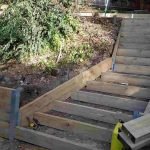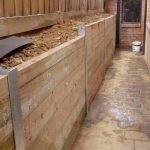Introduction
In today's hectic building environment, maintaining wall builders are constantly evolving to fulfill the needs of modern-day architecture and landscaping. The tools and innovations that these professionals utilize have gone through considerable developments, enabling higher performance, toughness, and visual appeal. Whether you're a house owner looking to install a retaining wall or a contractor looking for to improve your abilities, comprehending these ingenious solutions is crucial. In this article, we will delve into the latest tools and technologies used by modern maintaining wall builders.

What is a Maintaining Wall?
Understanding the Concept
A keeping wall is a structure designed to hold back soil or rock from a structure, structure, or location. These walls prevent disintegration and produce level areas on sloped terrains. They can be found in numerous products such as concrete sleeper, wood sleeper, timber sleeper, and even stone.
Importance of Retaining Walls
Retaining walls play an important role in landscape management. They not just provide structural support but likewise improve the aesthetic value of outside areas. House owners often seek expert services from retaining wall contractors to make sure that their setups are safe and visually appealing.
Exploring the most recent Tools and Technologies Used by Modern Retaining Wall Builders
The Advancement of Retaining Wall Construction
Over the years, standard methods of building maintaining walls have actually evolved significantly due to technological developments. Home builders now utilize various modern-day tools that enhance precision and efficiency in their work.
Advanced Surveying Equipment
One crucial advancement remains in surveying devices. With tools like laser levels and overall stations, retaining wall installers can achieve accurate measurements, which is critical for making sure that walls are level and steady.

Benefits of Laser Levels
- Accuracy: Supplies highly accurate leveling. Speed: Minimizes time invested in manual measurements. Ease of Use: Easy setup enables fast adjustments.
Innovative Material Handling Technologies
The handling of heavy materials like concrete sleepers or stone has actually enhanced drastically with brand-new equipment such as forklifts and telehandlers. These machines reduce labor costs while boosting security on-site.
Advantages of Utilizing Telehandlers
- Versatility: Can be used for multiple jobs beyond product handling. Reach: Capable of lifting materials to higher elevations without additional scaffolding.
Key Materials Used in Keeping Walls
Concrete Sleepers: Durability Fulfills Aesthetics
Concrete sleepers have become one of the most popular choices among contemporary contractors due to their strength and durability. They offer both functional advantages in addition to aesthetic appeal.
Why Pick Concrete Sleepers?
- They resist weathering much better than wood or timber options. Available in various designs to match various architectural styles.
Wood vs Timber Sleepers: Making the Right Choice
While wood sleepers are typically favored for their natural look, they can degrade with time due to moisture. Lumber sleepers provide increased toughness however at a greater cost.
Pros & & Cons Table:
|Product|Pros|Cons|| ------------------|-------------------------------------|------------------------------------|| Wood Sleeper|Natural look|Prone to rot|| Timber Sleeper|Long-lasting|Pricey|
Modern Design Methods in Retaining Wall Construction
Utilizing 3D Modeling Software
Today's maintaining wall builders frequently utilize innovative 3D modeling software application for design functions. This technology permits them to envision how different products will look together before actual building and construction begins.
Features of 3D Modeling Software
- Real-time adjustments. Enhanced partnership in between clients and builders.
Green Structure Practices
Sustainable practices are becoming significantly important in building and construction. Modern maintaining wall specialists typically incorporate environment-friendly materials such as recycled concrete or sustainably sourced lumber into their projects.
Construction Tools That Make A Difference
Heavy Machinery: Excavators & & Backhoes
Heavy equipment plays an important function in preparing websites for keeping wall installation. Excavators and backhoes are vital for digging trenches where walls will be placed.
Benefits of Using Heavy Machinery
- Reduces manual work requirements. Speeds up job timelines significantly.
Hand Tools: Never Underestimate Their Value
Despite advances in technology, hand tools stay vital for fine-tuning installations. Tools like shovels, trowels, and mallets make sure precision throughout the lasts of construction.
Safety Procedures in Retaining Wall Construction
Ensuring Employee Safety with Modern Gear
Safety gear has actually also progressed with technology; modern helmets geared up with communication devices permit workers to remain linked on-site while keeping security protocols.
Key Security Equipment
- Hard hats with interaction systems. High presence vests that improve worker exposure on-site.
Risk Management Strategies
Identifying potential threats early can save money and time down the line. Lots of professionals implement comprehensive training programs focusing on danger evaluation strategies tailored particularly for keeping wall projects.
Case Studies: Effective Retaining Wall Projects
Residential Project: A Yard Transformation
A recent property task involved transforming a sloped backyard using concrete sleepers created via 3D modeling software. The outcome was spectacular-- an aesthetically enticing yet functional area that met all client expectations!
Project Highlights
- Use of state-of-the-art equipment decreased labor expenses by 30%. Implementation of sustainable practices caused very little environmental impact.
FAQs About Keeping Walls
What kinds of materials can be used for retaining walls?- Common products include concrete sleepers, wood sleepers, timber sleepers, and stone.
- Look for experience, positive evaluations, proper licensing, and insurance protection when choosing a contractor.
- Yes! Local building regulations might determine height limitations or product constraints for maintaining walls; constantly talk to local authorities before starting construction.
- While DIY is possible for those with experience, it's suggested to seek advice from specialists if you're not sure about any aspect of the project.
- Installation timelines vary based upon size but normally range from one week to a number of weeks depending on complexity.
- Regular assessments are crucial; look for cracks or signs of motion periodically.
Conclusion
In summary, exploring the current tools and technologies used by modern-day retaining wall contractors exposes a market committed to development while prioritizing safety, efficiency, and sustainability. From sophisticated surveying instruments like laser levels to environmentally friendly building practices including sustainable materials like timber sleepers or recycled concrete-- each improvement serves not just functionality but also visual appeals most importantly crucial in today's architectural landscape. As homeowners end up being more familiar with these developments, working together with knowledgeable professionals ends up being essential-- ensuring that every job meets high requirements while adhering securely within spending plan restraints without jeopardizing quality!
Whether you're looking for help from a proficient retaining wall installer or preparing your next home improvement project yourself-- remaining notified about these developments will empower you every action along your journey!